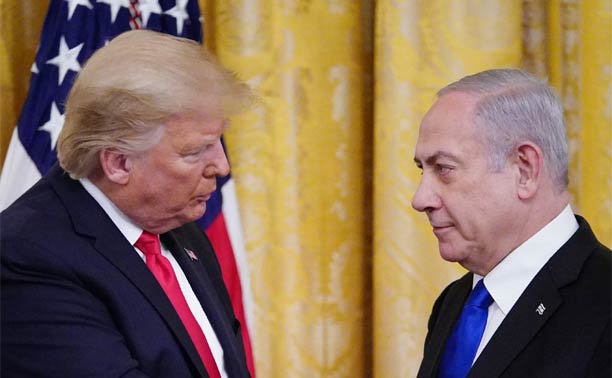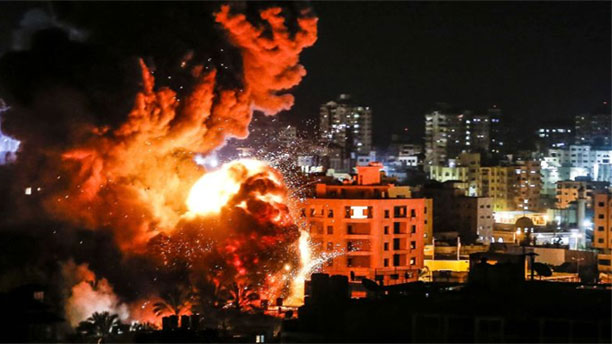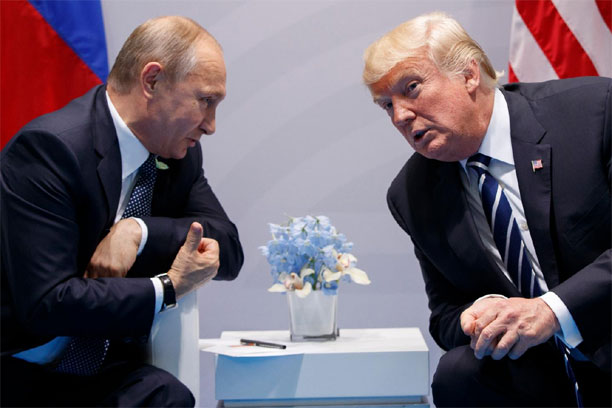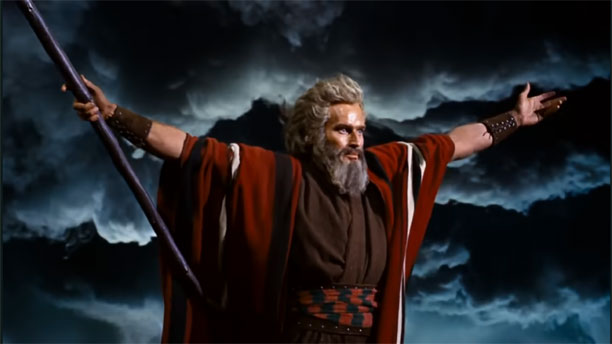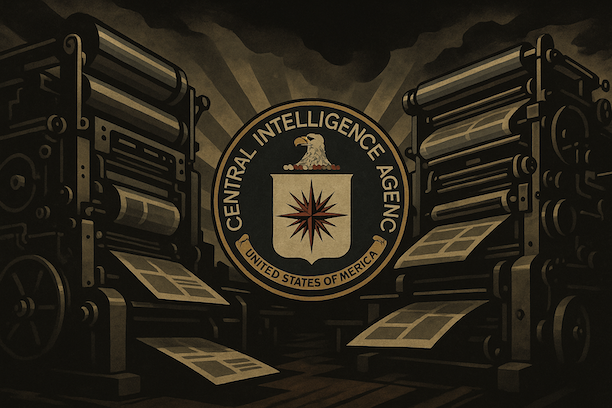Pages: << 1 ... 5 6 7 8 9 10 11 12 13 14 15 ... 1276 >>
Mapping Militarism 2025
By David Swanson, World BEYOND War

World BEYOND War has just released its 2025 edition of Mapping Militarism, which uses 24 interactive maps to highlight the state of war and peace on our planet. Each map allows the viewer to spin the globe, zoom in and out, scroll the timeline back through the years, or switch from map view to list view. Try it.
Unbelievable—The Utterly Unacceptable And Immoral Behavior of Netanyahu And Trump!
By Sally Dugman
I’m thoroughly shocked and appalled. I can barely believe my eyes and ears that Bibi Netanyahu, finally, “let the cat out of the bag”, and honestly fessed up about the truth that all along he and some of his cohorts planned a genocide for the Palestinians to rid the land (rightfully belonging to them and passed down generation after generation of ancestors of them) so that thieving Bibi and Israeli supporters once and for all can steal Gaza and more for Israeli ownership.
Big Tobacco on Wheels: How the SUV Industry Became the New Phillip Morris
Cathy Smith
"I’ve pronounced six kids this year with the same injury: crushed thoraxes from SUV grilles. Their height lines up perfectly with the bumper."
—Dr. Elena Martinez, Trauma Surgeon, UCLA Medical Center
There was a time when tobacco companies were the villains of American capitalism — peddling poison, silencing whistleblowers, and marketing carcinogens to children. But the Marlboro Men are dead. Their legacy, however, is not. It has been inherited, rebranded, and outfitted with leather interiors and a seven-year payment plan. Welcome to the SUV-industrial complex — the new Phillip Morris of our time.
If you think that sounds extreme, you haven’t been paying attention. SUVs kill more people than cigarettes did in their heyday — just not all at once. They murder slowly, publicly, and with plausible deniability. Behind each polished ad campaign, behind every rugged “Built for the Wild” slogan, lies a death toll, a gasping planet, and an army of Madison Avenue psychologists who know exactly how to sell you the illusion of power.
The Digital Dystopia of Death: How Israel's Talpiot Program Automates Genocidal Logic
Robert David
Israeli Defense Forces Lavender is 21st Century IBM's Hollerith Nazi Holocaust Punch Card Equipment
In the shadow of an increasingly-serious technological singularity, the once-evasive specter of genocide has been honed and maximized by machines that are no longer dependent on human impulse to commit genocide. Those were the days when death was engaged with by the fists of soldiers to the drum of anger or hatred. Extermination is outsourced to algorithms now. The Talpiot Program, Israel's best military tech talent pipeline, is the fulcrum of this lethal shift-turning the science of war into an assembly line, algorithmic process in carrying out death. It's no tale of battlefields littered with bodies. It's the calculating calm of a system that deploys death on purpose. It doesn't kill by accident, nor in reprisal-it kills as a matter of efficiency.
"The world is a dangerous place to live; not because of the people who are evil, but because of the people who don't do anything about it." Albert Einstein.
Domestic Violence Is Part of What War Creates
By David Swanson, World BEYOND War
As Stacy Bannerman has been telling us for decades, the U.S. military has a domestic violence problem. So do some other — and I strongly suspect all — militaries.
The Pentagon has long known about the significantly increased risk of domestic violence by combat-exposed troops, yet has failed to properly inform military members or their families, and has violated laws mandating reporting on the problem.
This lack of transparency and breach of legal responsibilities has left thousands of spouses, children, caregivers, parents, partners, and veterans dead, injured, suffering emotional distress and damages, and often struggling in silence without the resources or support they should have.
Lies, Truth and Morality
By Sally Dugman
One of the most fascinating writers about morality is Lawrence Kohlberg. I have read lots of his writings. He initially divided up morality into six stages. Some people are stuck on the lower levels or mid levels of his scale.What can be very interesting Is to look at yourself and others who you fairly well know and find out where you and they stand on the stages. It will well explain your family members, others and yourself. Why, it can even be used to define Modi and Trump, for instance. So you may wish to check out the link and materials at the bottom of this writing to get the information that, unfortunately, excludes the seventh set of data.
The Sacrifice of Innocents: Gaza, Divine Wrath, and the Gospel of Collateral Devastation
Ned Lud
I. The Righteous Indignation of the Goliaths Burning Gaza
In the shadow of a thousand warheads, under the weight of a whole history in blood and in scripture, Gaza rises as the altar of Moloch, its charred earth a sacrilegious altar for the new gods of algorithmic empire. What is it to speak of war and not speak to its holy hypocrisy - when scripture, sanctified by centuries of suffering, is wielded as a tool of power, manipulation, and destruction? It is here, where holy decree meets human savagery, that the sacredness of life is tainted and the sanctimony of empire is seen in all its destructive ferocity.
The Torah, once a moral guide, is now being exploited as a piece in the cynical game of power - bent to consecrate murder rather than consecrating peace. With every prayer recited in the name of God, with every appeal to justice, there is a sanctimonious irony: The innocent blood flows in Gaza, while the devout recite Psalms on the lips with which they bless their destruction. This is not the tongue of salvation. This is the tongue of sacrifice - not the righteousness now demanded, as of yore, by the Divine, but the ritual murder of the innocent. In this lamentable travesty, it is not the golden calves of Scripture, but the unclean machinery of war, equipped with high-technology precision, that now supplants the will of God.
How America Is Being Made Great Again
Paul Craig Roberts
Perhaps Putin should tell the Russian people and the Russian Army that his interest in resolving the conflict in Ukraine with peace negotiations lies in the possibility that the negotiations could be used to achieve a Great Power Agreement like what he and Lavrov tried to achieve with the West during the winter of 2021-2022 prior to Russia’s forced intervention in Ukraine. A New Yalta in effect.
Russian foreign affairs commentators have been speaking for some time about the need for a new Yalta agreement. A few years ago I was asked to address the Russian Academy of Sciences on the subject. I told them something that they did not want to hear: that Washington’s claim to hegemony prevented accommodation to Russian sovereignty.
The Judaic Religion, or Any Religion, Cannot Be a Standard of Influence for Modern International Law
By a Mortal Man
Our World’s Cataclysmic Reality of an End Times Wrapped With-in Biblical Mythology: Part IX
Note: This is not an argument that claims religious belief is bad or wrong; rather it is time for the world to get savvy to just how much humans and societies create religious meaning for their own ends.
No religion is infallible—especially since it is always the case that it is we, mere humans, who argue, and attempt to persuade others as to what are religious values and doctrines (including the manifestation of religious scriptures which too are recorded by us humans using human languages).
Equally religious beliefs and values evolve, change, and re-evolve like so much of human culture. There is no reason to believe the last word has been spoken or prophesied regarding religions in general (historical or so claimed). Every age has its own interpretations on Holy Healthy inspiration.
From Langley With Love: How the CIA Reshaped Modern Media—And What You’re Not Being Told
By Robert David
From Langley With Love—The Quiet Coup in Your Living Room
The revolution wasn't televised—it was written on the teleprompter.
You did not vote for it. You did not consent to it. And you are sure as hell did not get a press release. But sometime between the last honest war and the first Zoom briefing from CENTCOM, the Fourth Estate was silently folded into the national security apparatus like a classified annex.


